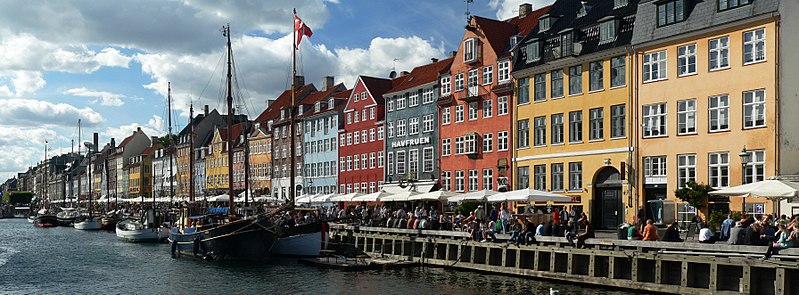
Nyhavn canal in Copenhagen. (Picture by Scythian from Wikimedia via Attribution-ShareAlike 3.0 Unported (CC BY-SA 3.0)
NetZero initiatives in Danish municipalities and the private sector
As part of a regular series of online events for Japanese local government professionals, JLGC’s 17th seminar welcomed Ms Tomoko Kitamura from Nielsen, Denmark, who lives on Lorient Island, a cultural translator living and working on the Danish island of Lolland.
The seminar featured a case study of Denmark, which has been taking advanced steps toward NetZero and SDGs, using a method that combines the five perspectives of industry, government, academia, the private sector and the environment, and the thinking behind these initiatives.
The seminar began with an outline of Denmark compared to Japan:
Denmark has a population of 5.84 million (125.5 million in Japan) and an area of 43,098 ㎢ (377,944 ㎢ in Japan).
GDP per capita is 67,758 US$, ranking 9th in the world (Japan is 39,340 US$, ranking 28th in the world). DEN
Denmark is a major exporter of diabetes-related pharmaceuticals and exports related to renewable energy.
Furthermore, Denmark ranks second in the world in terms of happiness (Japan ranks 54th), first in the corruption perception index (Japan ranks 18th), and is a major exporter of diabetes-related medicines and renewable energy.(In addition, Denmark has a very high democracy index, ranking 6th (Japan: 17th).
Denmark is a high-welfare, high-burden country, with free medical care and long-term care and free postgraduate education.
The main sources of taxation are income tax (around 50%), consumption tax (25%) and corporation tax (22%).
The energy situation in Denmark
Danish energy history is important because, in 1970, Denmark had an energy self-sufficiency rate of 5%. In 1970, Denmark was only 5% self-sufficient in energy, and two oil shocks caused major disruptions in the country’s daily life.
Subsequently, the Nuclear Information Organisation and the Energy Information Committee were established to collect and disseminate opinions in favour of and against nuclear power plants, and to discuss the construction of nuclear power plants. In the meantime, the Three Mile Island nuclear power plant accident occurred, and eventually about 80% of the public became opposed to nuclear power plants.
The Danish Government subsequently implemented various energy policies. Specifically, in the 1990s, an environmental tax was introduced with a shift to decentralised co-generation, and the promotion of wind power and offshore wind power.
In the 2000s, energy liberalisation was promoted and, at the same time, energy policies that did not rely on fossil fuels were promoted. In the 2010s, Denmark became the first country in the world to set an ambitious target to cover all electricity, heat, industry and transport from renewable energy sources by 2050. In Denmark, political parties agree on the direction the country should take, so the parties have switched several times since 2012. In 2020, the Danish Climate Act was passed, specifying a 70% reduction in carbon dioxide emissions by 2030 compared to 1990 levels.
Among the ground-breaking details of the plan are the creation of energy islands, the utilisation of CO2 as a resource through carbon capture, support for green industries, waste separation, phasing out oil and gas boilers, and sustainable biomass use.
Furthermore, in 2022, under the theme ‘Denmark can do more’, a policy on energy and security has been announced. The policy includes the idea that ‘Denmark has a responsibility to solve the global climate crisis’ and that ‘Denmark can do more’, by the phasing out of natural gas and the acceleration of green reforms in industry through green tax reform.
Drive-through recycling centres have been set up all over Denmark. The waste is sorted into about 40 different types for disposal, which are then turned into resources. The rates for waste disposal around Lolland is 4.5% is landfilled, 9% is incinerated and used for cogeneration, and 90% of the waste is recycled.
One aspect of the public debate in Denmark was discussed as a widespread belief that large cities from a sustainability perspective are like babies in an incubator in a paediatric ward. This is because they cannot survive without food, energy, labour and drinking water from the countryside.
This is based on the idea that people cannot survive without food, energy, labour and drinking water from the countryside.
The full report from the seminar can be seen HERE (Japanese only).
Videos of the most recent seminars, on leading environmental policies from Sweden and Denmark, can also be viewed online HERE (Japanese only, for a limited time).

